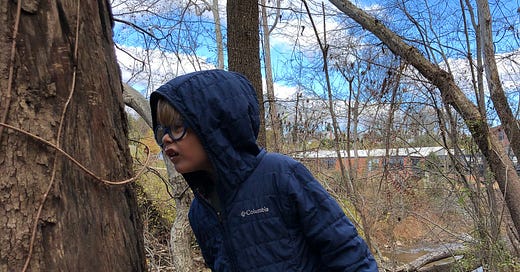Throughout my childhood, my parents and grandparents were always careful to use the specific names of plants and animals with me. Instead of, “Look at that bird,” it was, “Look at that Carolina wren!” Instead of, “What a pretty flower,” it was “What a pretty cluster of Sweet William!”
I have long valued being able to call things by their specific names, drawing mostly from that reservoir of remembered names from my youth, and I remain eager to continue building my glossary of the natural world. There’s still so much I can’t identify! There are always so many more names to learn. (We’re always on hawk watch, for instance, but I still can’t tell the difference between a red-shouldered and red-tailed.)
We have endeavored to continue this nature-naming tradition with our boys. I teach them plant and animal names, and Guion (of course) covers the entire fungi kingdom. For what he lacks in basic bird identification, Guion more than makes up for in mushrooms. Because of this dedicated tutelage, at 3, Moses has now far surpassed my own knowledge of fungi, and on hikes, he is frequently exclaiming, “Mom! Come see this jelly wood-ear!” Or, “Dad, is this one edible? I think it’s edible.” (And he’s usually right. But we don’t let him taste test to find out.)
I’ve written about this exhaustively elsewhere, but it is a bit of a personal crusade (sorry/not sorry). Naming is always the first step toward intimate knowledge and then, importantly, affection. If we cannot name the world around us, why bother caring for it in the first place?
I am always blown away by people who claim to care deeply about the climate but can’t identify more than three plants in their immediate vicinity.
I’m reading Robert Macfarlane’s poetic dictionary of British Isles place language right now, and he writes about the importance of this naming heritage:
“Children are now (and valuably) adept ecologists of the technoscape, with numerous terms for file types but few for different trees and creatures. For blackberry, read BlackBerry. A basic literacy of landscape is falling away up and down the ages. A common language—a language of the commons—is getting rarer. And what is lost along with this literacy is something precious: a kind of word magic, the power that certain terms possess to enchant our relations with nature and place.”
It may sound like New-Age-y nonsense, but I ardently believe that there is no better place to start transforming our conception of our planet than to name.
There’s a victory and a delight that sparks in Moses’s eyes when he correctly spots and identifies a living thing. Just having names at his disposal has already fundamentally altered the way he interacts with his environment. He is a very curious and strange child, but I thrill to see the ways he is taking to committing the names of living things to heart. (It remains to be seen whether Felix will also take to this naming heritage, as he seems much more intent on destroying nature than pondering it.)
A new frequent comment from Guion:
“You cannot write about this in your newsletter!”
No better way to make me desperate to write about something.
Things That Would Have Been Good for Me to Do
Have daughters. Daughters are a super-great investment in your comfortable elderhood. Sons, not so much.
Measured the windows before I bought more Roman shades, instead of assuming they were the same size. They are not the same size, Abby. They are less than 1/4” inch narrower and now everything is ruined.
Paid attention in math class.
Currently Reading
Landmarks, Robert Macfarlane
Regarding the Pain of Others, Susan Sontag
First People: The Early Indians of Virginia, Keith Egloff
The Fifth Season, N.K. Jemisin




Oh you got me at McFarlane…he is a wonder. Book Group is reading The Underlands this month and I keep a copy of his The Lost Words for gifting families. Will be looking your book choice up!
And have suffered the same experience with window measurements (and math classes) so all my sympathy.